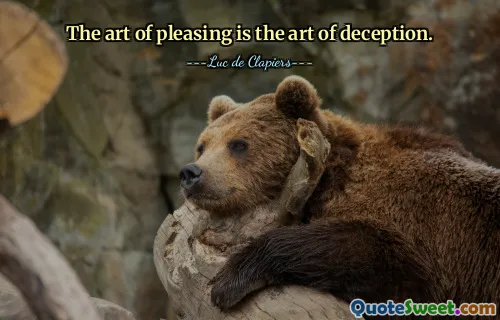Luc de Clapiers, better known as the Marquis de Vauvenargues, was a French writer and philosopher born in 1715. He became known for his insightful reflections on human nature, morality, and the complexities of society. Vauvenargues's works explore themes of wisdom, emotional depth, and the importance of personal integrity. His writing style combines philosophical thought with a literary flair, making his ideas accessible to a wider audience. Despite his relatively short life, having died in 1747 at the age of 31, Vauvenargues left a lasting impact on Enlightenment philosophy. He believed in the power of reason and the value of self-awareness. His thoughts on friendship, love, and ambition continue to resonate, as they delve into the fundamental aspects of human experience. He emphasizes the need for a balance between intellect and emotional understanding. Vauvenargues was influenced by other Enlightenment thinkers and sought to contribute to discussions on ethics and moral philosophy. His legacy persists not only in his written works but also through his influence on later philosophers. In the realm of literature, his reflections provide a foundation for exploring the human condition, making him a significant figure in the evolution of Western thought.
Luc de Clapiers, born in 1715, was a French philosopher and writer, widely known for his insightful comments on human nature and society. His works reflect deep moral and philosophical questions, wrapped in a literary style that appeals to many readers.
Despite his brief life, which ended in 1747 at just 31, Vauvenargues profoundly influenced Enlightenment thought. His exploration of themes like friendship and ambition reveals a commitment to understanding the complexities of human emotions and ethics.
Vauvenargues was part of a broader movement of Enlightenment thinkers, contributing to discussions around morality and reason. His legacy endures through his writings, which continue to inspire reflection on the human experience and serve as a foundation for future philosophical inquiry.
More »
Today Birthdays
1729 -
Edmund Burke
1949 -
Haruki Murakami
1954 -
Howard Stern
1876 -
Jack London
1993 -
Zayn Malik
1951 -
Kirstie Alley
1863 -
Swami Vivekananda
1923 -
Alice Miller
1987 -
Naya Rivera
1825 -
Brooke Foss Westcott
1944 -
Joe Frazier
1951 -
Rush Limbaugh
1964 -
Jeff Bezos
1978 -
Jeremy Camp
1628 -
Charles Perrault
1856 -
John Singer Sargent
1970 -
Kaja Foglio
1953 -
Rick Santelli
1986 -
Gemma Arterton
1968 -
Raf Simons
1958 -
Christiane Amanpour
1966 -
Olivier Martinez
1996 -
Ella Henderson
1917 -
Maharishi Mahesh Yogi
1949 -
Ottmar Hitzfeld
1928 -
Ruth Brown
1968 -
Heather Mills
1946 -
George Duke
1968 -
Rachael Harris
1923 -
Ira Hayes

